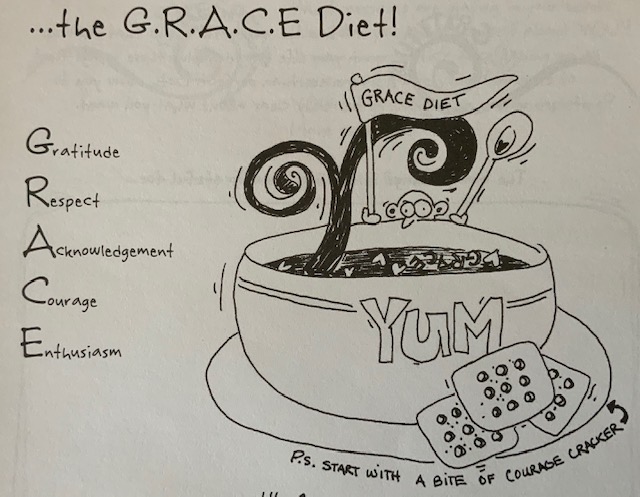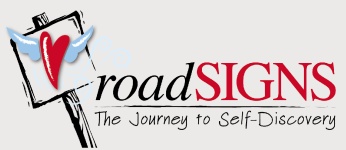
For some reason I awoke this morning in a searching frame of mind. What kept emerging through this search was GRACE. I have always considered GRACE as one of the four pillars of my work and life. I define it as ‘ Being is a state of Grace with the world and within your relationships; allowing yourself to surrender and be in the flow.’
As I continued my rumination my mind tracked back, remembering a chapter in the ME FIRST Playbook in regard to the GRACE Diet. Themes repeat themselves in my life and I saw this as a SIGN to resurrect and review some of the tools and exercises I have created in the past. Memory is an interesting thing for me as I often lose sight of what I have written and taught over the years, not in a way that invalidates it, simply that my mind marches on.
Given the body of work I have accumulated, moving on at this point may mean returning to what I have known and practiced and resurrect the principles, ideas and teaching which have been the backbone of my work. Since I have been called back to GRACE, I have decided to use this as my starting point.
The GRACE Diet was created to address the junk food diet many of us feed ourselves on a daily basis. I am not referring to the food you put into your body in the context of what you consume, rather the diet you are feeding your spirit. Are your words to self spiritually uplifting or depleting? And if you have developed the art of putting yourself down, how can you begin re-programming that inner conversation. This is where the GRACE diet comes in, an acronym standing for Gratitude, Respect, Acknowledgment, Courage and Enthusiasm.
Gratitude: gratitude practices are bountiful these days, whether you keep a gratitude journal, have a daily practice of sharing gratitude with friends, or at the end of day as a before bed ritual. It is easy to assume that such a simple practice is fluffy or unsubstantial yet research has shown that those who practice gratitude regularly are more positive in their view of themselves and of life. Knowing this, why not give it a try. I can personally testify that I have had a daily gratitude practice for over twenty years and it is an activity that fuels my positivity every day.
Here is your opportunity– try the 21 day gratitude challenge, recording 3-5 gratitudes every day for 21 days in a gratitude journal and see what happens. Gratitude helps you notice what is right with your life.
Respect: I am referring to self-respect. In fact you can not elicit respect from others if you do not respect yourself. This is a simple truth. Time to check your inner dialogue and listen to the stories you are weaving about yourself. Remember that a large portion of your story was never yours; it was given to you by others – a parent, a teacher, a friend, some external source. What they saw or believed is not yours to own. Respect implies that you begin to see the truth of who you are and re-direct the inner-critic to becoming your inner-coach. Most importantly begin simply with I am enough.
Your opportunity: listen in to your inner dialogue, record the five most common things you tell yourself and, if they are not uplifting, re-write them. Now say them to yourself repeatedly. You are now in the process of ‘neural re-programming’, creating a new inner pathway.
Acknowledgment: acknowledgment marries gratitude and respect, in fact I often refer to self-acknowledgment as the highest form of gratitude. This takes respect a step deeper but encouraging you to see the gifts and strengths you possess, the impact you have in the world, the important roles you play in the lives of others. This is no small thing even though you may not feel important. I refer to it as the highest form of gratitude as self- acknowledgment means thanking your higher power for the gifts you possess, whether this refers to your abilities within your career, as a parent of family member, for your creativity or expertise. It goes like this, ‘I acknowledge my love for writing and relaying messages of hope and selfness to others.’
Your opportunity: as part of the 21 day gratitude journal, add on 2-3 self-acknowledgment statements. You might be surprised at what you learn about yourself. BTW a great source for self-acknowledgment can be harvested from the feedback you receive from others.
Courage: courage is the backbone of GRACE. The ME FIRST journey is not for the faint of heart, it is for the brave. It is easy to go through life accepting everything, never addressing your inner dialogue and riding the wave of self-deprecation. It may not be healthy yet many people will not addressing it on. Trust me; it takes courage to face yourself, go inward, re-shape the inner landscape, face the self-critic and tell him/her they are out of date, and design a new conversation. And those who choose not to join you on the journey will share their skepticism and endeavor to pull you back. Courage, listening to your heart – it desperately wants to heal, which wants to guide you forward into a more positive and beneficial relationship with yourself.
Your opportunity: create a daily practice where you pause, reflect and ask your heart, not your head, what it wants. Simply listen in.
Enthusiasm: begin to identify moments of joy in your life; pay attention to what lifts you up; limit your access to negative news (lord knows there is plenty of that these days), and play with people who generally have an optimistic attitude. In other words, feed your enthusiasm for life. Allow yourself to dream and consider the future. Share those dreams with others and encourage them to share theirs. Create a vision board that lights you up and which, when you look at it, inspires you.
Your opportunity: back to the 21 day gratitude journal, add 1-2 things which are fueling your joy and enthusiasm each day. One of mine: I am enthusiastic about the new opportunities opening to me at this time in my life. (BTW I have no idea what they are, I simply trust they exist!).
Let me close with a quote from Thich Nhat Hanh: “ If you are capable of living deeply one moment of your life, you can learn to,live the same way in all other moments of your life.”
The GRACE diet is a recipe for emotional and spiritual health that can sustain you and lead you to a more meaningful life.
Blessings and Until Next Time,
Betty
